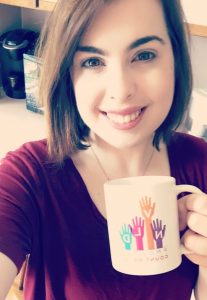Rapid fire. If in this moment you had only 10 seconds to choose whom you trust most in your heart, spirit and mind in this world– who would it be?
Hold on to your answer.
I will admit outside of this moment I have never had the opportunity to ask this question to a large number of people nor hear the answers that would be shared in response. For me, up until recently if you had asked me this question I would have responded by rattling off an inconsistent yet long list of my most beloved people- plus some. One thing I know for certain though, is that I definitely would not have answered this question with “myself.”
Did you?
 A cliché as the idea sounds, at some point most of us have or will realize that trust in one’s self is the most basic yet necessary element to surviving emotionally and physically in this complex world. Some of us learn this young, and others later in life. I myself have only just started to understand this reality at twenty something, and I have begun to wonder how we as humans develop the ability to trust in ourselves. If it is so critical to our survival, why do so many of us struggle to do it?
A cliché as the idea sounds, at some point most of us have or will realize that trust in one’s self is the most basic yet necessary element to surviving emotionally and physically in this complex world. Some of us learn this young, and others later in life. I myself have only just started to understand this reality at twenty something, and I have begun to wonder how we as humans develop the ability to trust in ourselves. If it is so critical to our survival, why do so many of us struggle to do it?
I have been thinking a lot about what my journey around trust has been, specifically as it relates to my experiences as a disabled woman, who was once a disabled child.
What I have realized in my experience of having NVLD is that when people weren’t erasing my identity as a disabled person entirely, they were sometimes conversely unintentionally giving me the message either directly or indirectly that I couldn’t trust myself, my perception or my understanding of the world as a result of my disability. An idea that only gets magnified after one too many mistakes you might make along the way trying to figure things out solo. While I don’t think these messages were or are given with bad intent most of the time, they do have an impact on those who receive them. Pretty quickly after adopting this mindset, you can get tangled in a web of misplaced yet mostly well meaning guidance, utter confusion, and the habitual need for outside validation. I know for me this has been my story.
There is the idea in society that as a disabled child or adult, you need someone to save you and protect you. That you are at a point of deficit not difference. I think this requires us to ask the question, does this type of thinking in our world allow for every person regardless of identity to have equal validation and empowerment to trust themselves?
This is not at all to imply that help, support and allyship are not of great importance. I would not be here today without the amazing people who have stuck by my side with grace, patience and compassion. I couldn’t be more proud to be a member of the NVLD community despite the challenges I face. But I do wonder what are the ways folks disempower neurodivergent people like myself, by revoking our right to autonomy and self- determination when they think they know better for us. What goes missing when we try to take away someone’s right to make mistakes, learn by trial and error and find their own power in their inner voice and intuition?
My challenge today is for each of us to think about how we interact with neurodivergent children and adults, specifically those who have neuro cognitive disabilities and spectrum disorders. How can we create experiences of empowerment and support? Encourage self- awareness AND self- assurance? We all deserve to experience the most powerful and important form of trust.
Gabriela
Gabriela is a social work professional, working and living with NVLD. She is passionate about social justice, community connection and the human experience. Her journey with NVLD was once focused solely on her challenges and failures, but has now transformed into a lifelong experience of healing and self-acceptance. Gabriela is a Project Social Ambassador for The NVLD Project.








